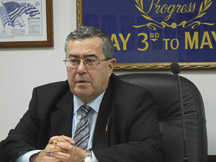Guttenberg has experienced significant changes over the last two years, including new personnel in key posts, new faces on the Town Council, and the corruption conviction and resignation of former Mayor David Delle Donna and his wife Anna.
An interim mayor, the late James Hannon, was appointed to replace Delle Donna in spring 2008, serving until current Mayor Gerald Drasheff ascended from the council to the mayoralty in the November 2008 election.
John Habermann, the former vice president of the Guttenberg Board of Education, was chosen to fill the rest of Drasheff’s term on the five-member Town Council. Alfonso Caso was appointed last year to Frank Criscione’s council seat after he resigned.
For the first time, these Guttenberg candidates will be running unopposed.
________
On Nov. 3, Drasheff is seeking his first four-year mayoral term.
Councilmen Efrain Velez and Habermann are also vying for four-year terms. Caso is running for the remaining year of Criscione’s unexpired term. Monica Fundora, a newcomer, is running for a four-year term to take the seat of Councilwoman Adela Martinez, who is stepping down at the end of her term on Dec. 31.
What’s unique about this election is that not one of those running has opposition.
Drasheff said that during his eight years as an elected official, it’s the first time that’s happened.
“It’s an interesting sensation,” said Drasheff. “It feels good to run unopposed. The town has been through a lot of turmoil through the last couple of years. The fact that we’re running unopposed means that people are relatively satisfied in what we are doing.”
While Guttenberg is small geographically, it has a population of around 11,000 people.
Working together
Drasheff said political opposition can sometimes be helpful, but often is distracting and counter-productive. He said more participation from the public, like attending council meetings, would be a good way to deal with issues.
In the past, he said, much of the opposition came from the western 5th district of the town, which borders Kennedy Boulevard.
He also said much of the opposition was personal, but went away after certain people left the council. For example, Thomas Rizzi ran against Delle Donna in four different elections, but after Delle Donna’s conviction, Rizzi moved out of town.
“This was a major source of social activity for them, the political arena, and they enjoyed the fight more,” said Drasheff. “I think it’s a part of [living] in a small town. I think politics becomes a passion with people.”
Martinez, 70, who cited her health as the reason she is not running for reelection, said that hopefully the lack of opposing candidates means that the current administration has been doing a good job.
“There will be something, somebody will surely come up [in the future], but in general we’ve been doing a good job” said Martinez.
New voices
Drasheff said that in the past, people like Rizzi were able to gather strong followings. While campaigning recently, Drasheff said that some of the lines that had been drawn in the past were blurred.
Right now, he said, the town has the opportunity to bring those opposing voices into the process. He hopes more people come to council meetings and take part.
“We don’t get large turnouts at our council meetings,” he said.
Caso said the year 2000 was when he noticed that many town departments were run inefficiently, which made him want to join the council.
Caso said that maybe residents are willing to give the new members on the board a chance, or perhaps the opposition is tired of fighting against them.
Habermann said that maybe the lack of attendance at council meetings is because the council members tend to be accessible throughout Guttenberg on a day-to-day basis.
Not your normal politician
Drasheff spent many years working for the Port Authority of New York and New Jersey. Caso spent years in finance, and Habermann works as an attorney. All three candidates said that part of the reason the town may feel comfortable with them is that they are new voices without career political experience.
“This is not my whole life,” said Drasheff. “There is a part of me that existed before this. This is an opportunity to continue to do the things I liked to do before I retired, and I’ve often said that the political side of this [is what] I don’t like as much as the governing part.”
Future goals
During next year’s June primary and then in the November general election, Caso and Councilwoman Donna Florio will vie for their seats again. Drasheff hopes that they can have a full four years to work on projects without time-consuming and costly elections.
As far as future goals, he hopes to redo the town’s master plan and build a waterfront park and dual-use community recreation center that will also be used as an expansion to the Anna L. Klein School.
“If you have six people that are planning on working together and if they stay that way, then they have more of a chance of putting things right again,” said Caso.
Florio also looked forward to the council going in “the right direction.”
Velez could not be contacted for this article because he was in Puerto Rico caring for his ailing mother. Fundora did not return phone calls in time for publication.
Tricia Tirella may be reached at TriciaT@hudsonreporter.com.
